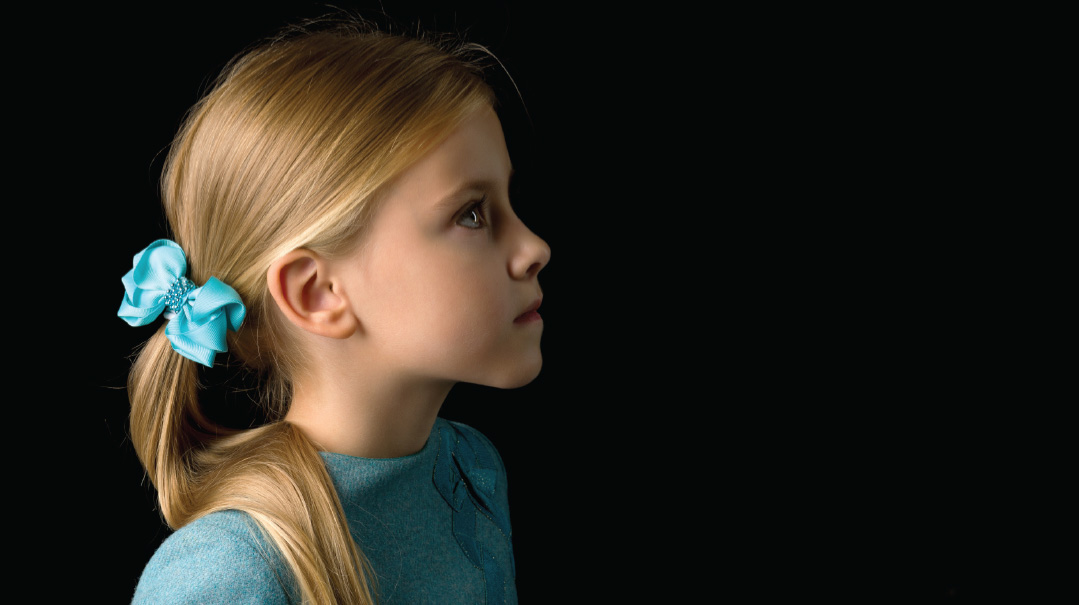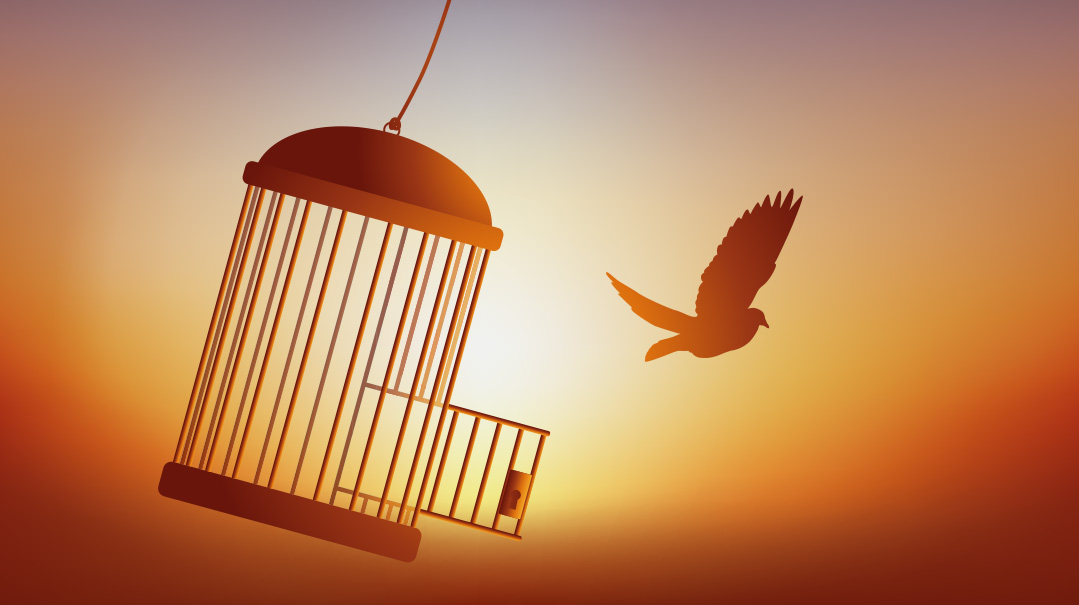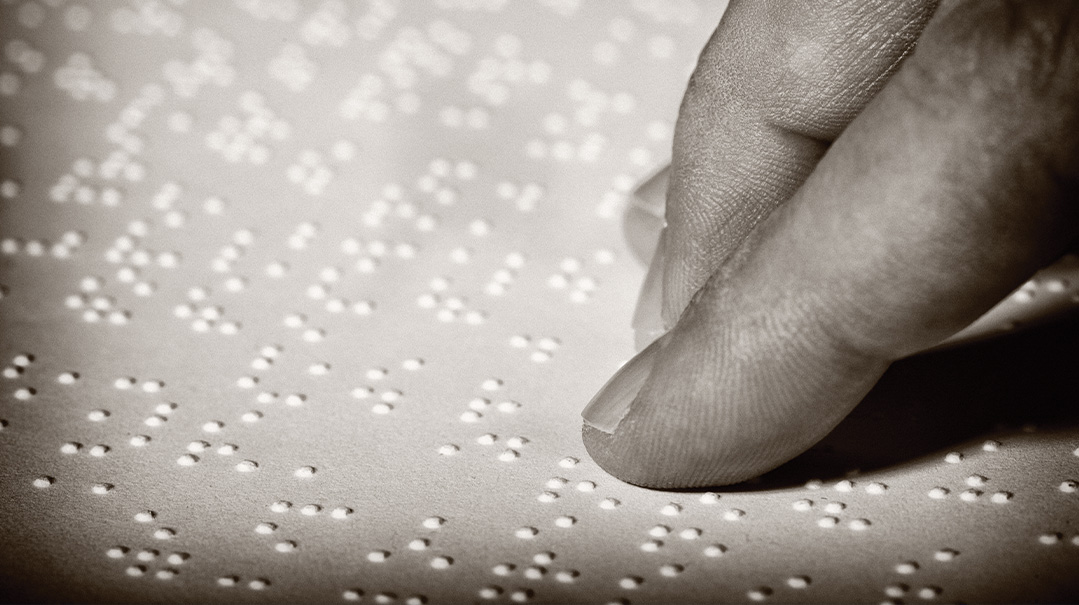Finding my Voice

My stutter didn’t just turn up one day, like it does for some people after a traumatic event — it’s been with me for as long as I can remember

As told to Devorah Grant
“I’m cccc-cccc-cccc-ollecting fff-ooo-rrrr….” I don’t get to finish my sentence before a dollar bill is impatiently thrust into my little collections purse by a woman, and the heavy grey door is firmly shut in my reddening face. Welcome to life as a stutterer.
Most people don’t need to think twice before picking up the phone to make a phone call. Most people have no need to agonize before they approach a saleslady or thank the bus driver. I do. While my four sisters are loud, extroverted, and talkative, I measure my words as if they’re gold. That’s because of my stutter, too.
My stutter didn’t just turn up one day, like it does for some people after a traumatic event — it’s been with me for as long as I can remember. I stuttered my way through the alef-beis and the ABCs. I didn’t know that “stuttering” was what it was called, of course. I just knew that while Ruty and Bayla could open their mouths and speak, I opened my mouth and... things took longer. I stuttered at school, and stuttered at home, and slowly I began to realize that I was different from everyone around me.
My parents and teachers realized I was struggling, too. I went to speech therapist after speech therapist, missing school every Tuesday afternoon (during my favorite art class) and every three Thursdays (during my worst math class, yay!) to do countless exercises to help me get the words out. I practiced speaking ultra-slowly, stopping on letters I found the hardest to say, and had special breathing techniques to gain clarity in my syllables.
Chana, my first speech therapist, had pictures all over her wall of different mouth movements I could practice to help my stuttering, and I would stand there, week after week, making faces that alternatively made me laugh or cry. I still remember the yellow-rimmed mirror with the elephant on top saying, “Yes you can.” To be honest, I felt like it was teasing me. Really? Who says?
Of course, stuttering wasn’t just about speech therapy sessions, it was also about social situations and friendships. I’m lucky enough to have two amazing friends who have been with me since I was really young, but I went through my fair share of trials. For someone who stutters, speaking is often humiliating, and bullies can easily sense that, and take advantage of it. Like the time in second grade:
“Ssssss-ayyyyy ssssss-illlly sss-aaaauuu-ssss-aaggg-eesss” shouts Binah, hanging over me with a group of girls behind her. The smell of pretzels on her breath makes me feel nauseous. Where are Ruty and Bayla? “Come on, ssss-aaaaay it for us Rachel, pppp-llleeeease?” The girls snicker. My eyes fill. Thank You, Hashem for the recess bell….
It was that kind of thing and more. Not too often, baruch Hashem, because my parents and teachers kept an eye on it, but enough to leave scars that still feel raw when I speak about it. Still, I got by, mainly by speaking minimally and allowing others in my life to talk for me in public — like my sisters and my friends, Ruty and Bayla. By letting others explain what I wanted or needed, I could safely avoid feeling embarrassed when I couldn’t get my words out.
My parents, by the way, were not fans of this avoidant strategy. They were incredible cheerleaders, telling me that all the efforts I was putting in were valuable — even when I was in tears at not having managed to do any of the speech therapy homework — and they came with me from specialist to specialist, time after time. Yet because of their great care for me, they also didn’t want me to be rendered mute in public, and they would tell me and my sisters this, repeatedly. “Rachel has a mouth,” my mother would remind Shira as she opened her mouth to ask the dentist receptionist for my prize when I was seven. “Let Rachel speak,” she warned Tali, as we walked into the shoe store to buy me new shoes at age 11. I resented what she did at the time, even though I knew it was out of love.
My father was my biggest support. Although he does not stutter himself, he has the tiniest lisp, which also caused him humiliation growing up. When he saw how much I was suffering, I felt like he heard and understood my plight, and in some ways, that made taking advice from him easier. “You’re worth more than your stutter,” he would remind me, pacing back and forth on the living room floor with an agitated face. “Don’t let anyone treat you as less than,” he reminded me. So somehow, with both my parents behind me, I made it through. Still, my self-esteem was weak and easily battered, like a rowboat in a roaring ocean. Which is why camp was a big subject.
At first, I was just a little nervous. I was heading to Camp Rina with Ruty and Bayla beside me, and I knew that even when meeting new girls, I would have them for backup. Ruty always knew how to handle a difficult moment, while Bayla made enough noise to drown out all my garbled syllables. I was really anxious about how it would be to meet new girls and barely manage to vocalize my name, but with my family and two best friends behind me, I was willing to try. Then, the unthinkable happened.
First, Bayla’s brother got engaged. Beautiful news, right? Yup, except that he was getting married the first week of camp. Meaning… Bayla wouldn’t be there that week. Yikes. I panicked, called Ruty, and we spoke for hours. I was going to be okay, I was going to be okay. Then Ruty’s niece got sick. Suddenly, I was facing my biggest nightmare: going to camp with a few odd classmates and no one to save me from my poor, stuttering self.
“I’m not going.” I told Abba. “It’s not worth it. I’ll be miserable and lonely and I won’t cope. I need Ruty.” My stutter gets worse when I’m upset, and I was flinging out the words in weird staccato chunks. Abba paced. Ima came in. “I won’t go. I can’t,” I said, matter-of-factly. Stalemate.
We had a long conversation. We spoke through the pros (my parents), the cons (me), the practicalities, the issues. We went round and round and round. It was exhausting. Finally, Abba turned to me and said: “Look Rachel, we know you don’t want to do this, and we won’t force you. You’re right that there will be no point going if you think it will be miserable and impossible and you won’t cope.” I breathed a sigh of relief. “But,” Abba continued, “if you do go, you’ll actually get the opportunity of a lifetime, because for one week, you’ll have to manage speaking for yourself, and find the confidence to be yourself without your friends there to help you. We won’t force you, but we think you can do this.” I glared and marched off. True, Abba and Ima had let me make my own decision, but now I was stuck between what I really wanted, and what I knew, in my hearts of hearts, was true. Somehow, I’m not sure how, I chose the latter.
Oh, it was hard. Boy, was it hard. I cried for the first three nights of camp, and embarrassed myself again and again, trying to introduce myself, to chat with my bunkmates, to join in the cheering. Each day I struggled, and each day I wanted to take the next bus home. But I didn’t. Because somehow, among all the humiliation and wordlessness, I began to find me. Not the me who needed two faithful sidekicks to speak on my behalf. Not the me who cowered in corners, afraid to say something. Not even the me who spoke only to two or three people, and never in front of a group. Nope. Because somehow, I heard Abba’s words in my head, and I knew this was my chance.
I stuttered my way through and aced it anyway. By the time Bayla turned up in camp, I knew things weren’t going to be the same anymore. I had found my voice.
Since then, I have been to many more speech experts. Each one says they have ways to help me, and each time, I become better at managing my stuttering, which is still very much with me, and likely, will be for life. I struggle often with my inability to speak easily, and it’s far from a bed of roses. But, like Abba reminded me all those years ago, and which sticks in my brain when things are tough, I now know: I am not just a stutterer. I am a person, who happens to stutter, but there’s more to me that that. So here I am, sharing my story, and sharing my voice. Thank you for listening.
(Originally featured in Teen, Issue 97)
Oops! We could not locate your form.







